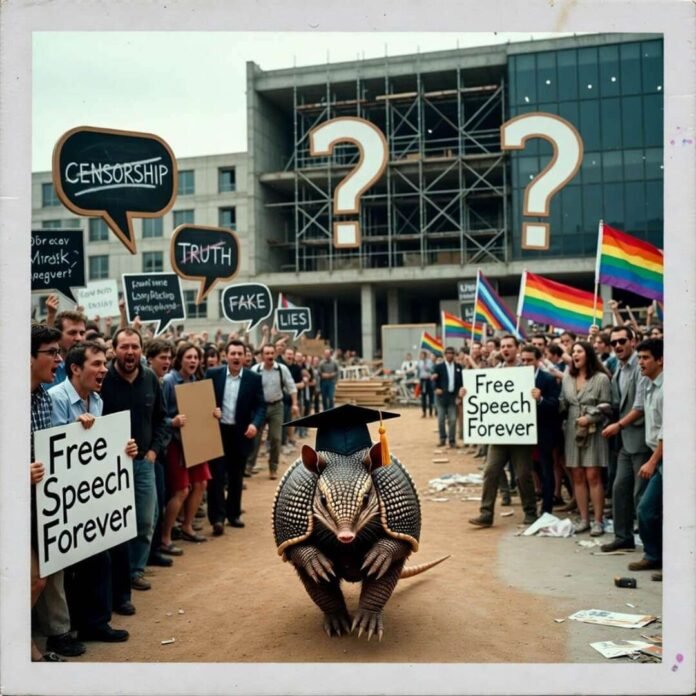The University of Austin Campus controversy slapped me awake at 3 a.m. last night—I’m in this sketchy Austin motel off I-35, the kind where the ice machine growls like it resents you, and my phone’s blowing up with another UATX thread. Brisket grease still on my fingers from dinner, bats screeching outside like they’re arguing Foucault, and I’m just… hooked. As a guy who’s flunked out of two community colleges and once thought “critical theory” was a band name, this place? It’s my chaos catnip. Raw truth: I love it, I hate it, I applied for a fellowship and spelled “passionate” wrong in the essay—mortifying, but here we are.
Why the University of Austin Campus Controversy Won’t Let Me Sleep
That Time I Crashed a UATX Lecture and Spilled Coffee on a Billionaire’s Son
Remember 2021? Pano Kanelos drops his Forbes bomb and I’m in my Chicago studio, hungover on cheap Malört, thinking “YES, finally a college that gets it.” Fast-forward to now—me sneaking into a UATX preview event last spring, clutching a Whataburger cup like body armor. Some tech heir in Patagonia vest starts monologuing about “meritocracy” and boom, my iced coffee does a perfect arc onto his Lululemon kicks. The silence? Deafening. That’s the University of Austin Campus controversy in a nutshell—grand ideals, clumsy execution, and me as the human spill hazard.

- Pro tip from a repeat offender: If you’re gonna crash a debate, bring a lid. Learned that the hard way.
- Weird flex: The kid actually laughed. Said his dad owns the coffee chain. Of course he does.
The University of Austin Campus Controversy vs. Austin’s “Keep It Weird” Vibe
When Rainbow Flags Meet Barbed Wire Fences
Austin’s all bats and breakfast tacos and “weird”—then UATX rolls in promising a “classical” oasis. The Guardian called it a far-right fever dream, and honestly? From my spot slurping migas at 2 a.m., watching drag queens glitter-bomb past construction sites, it kinda is. I tried explaining “DEI fatigue” to my barista—she’s trans, covered in tattoos, just handed me extra hot sauce and said “bless your heart.” That’s the Austin university backlash right there: progressive utopia vs. anti-woke fortress, separated by one very confused armadillo.
My Dumb Mistake That Still Haunts Me
Tried starting a “free speech club” in high school. Ended with me reading Ayn Rand aloud while the AV club filmed it for memes. UATX feels like that moment, but with actual money and consequences.

Free Speech or Echo Chamber? The University of Austin Campus Controversy Gets Real
That One Time I Got Ratio’d by a UATX Student
Posted a hot take on X: “UATX sounds cool but what if you’re a leftist who likes Plato?” Got swarmed. One kid DM’d me a 47-page manifesto. I’m eating gas station taquitos at the time, salsa dripping on my phone, thinking—this is it. This is the most controversial college energy. Inside Higher Ed’s piece says they silence dissent; my inbox says otherwise. Or maybe both. My brain hurts.
- Things I learned the hard way:
- Never tweet while hungry.
- “Devil’s advocate” is code for “prepare to be blocked.”
- Armadillos are surprisingly good listeners.
Billionaires, Backlash, and My Crypto Regrets
Elon Dropped Millions and I Dropped My Jaw
Elon Musk donates big bucks, Peter Thiel lurks, and suddenly UATX isn’t a scrappy startup—it’s a Silicon Valley side hustle. I tried the tech-bro life once: bought Dogecoin at the top, sold at the bottom, cried into my ramen. Now watching billionaires “fix” education feels like that moment your ex who ghosted you starts a podcast about relationships.

The University of Austin Campus Controversy Is America’s Mirror
And It’s Cracked in All the Right Places
Last reason this place owns the “most controversial college” crown? It’s us. All of us. The culture war in brick and mortar (or half-built scaffolding). I’m leaving Austin tomorrow—motel checkout at noon, brisket coma at 11:59—and the University of Austin Campus controversy will still be trending. Maybe that’s the point. Messy, loud, imperfect. Like democracy. Like me.
Look, if you’re as obsessed with this UATX drama as I am (and trust me, the Whataburger stains on my shirt prove it), do this:
- Read the Texas Monthly takedown.
- Argue with someone who disagrees. Buy them tacos first.
- Tell me your wildest campus story below—bonus points if it involves spilled liquids.
I’m out. The ice machine is judging me again.



